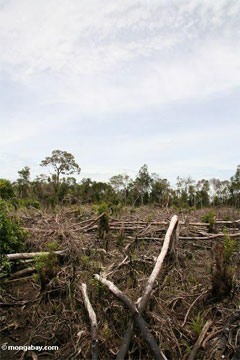United States and Indonesia to fight illegal logging
Rhett A. Butler, mongabay.com
April 5, 2006
The United States and Indonesia today agreed to fight illegal logging in some of the world’s most diverse rainforests.
Indonesian Trade Minister Mari Elka Pangestu and Chief of the US Trade Office (USTR) Robert Portman said the two countries will coordinate efforts of protect Indonesia’s forests which have been significantly degraded and destroyed by the illicit timber trade.
“This is a place where good trade policy and good environmental policy intersect. Illegal logging depresses timber prices and damages the environment,” Portman told reporters at a joint news conference. “Together we will seek to take concrete steps such as increasing law enforcement and promoting public-private partnerships to tackle a pressing environmental problem while facilitating trade. We will work together as wise stewards of the environment and global markets at the same time… This is a unique opportunity to strengthen our cooperation with Indonesia to better protect Indonesia’s parks, forests and sensitive habitats from illegal logging.”
While Indonesia houses the most extensive rainforest cover in all of Asia, its natural forest area is rapidly being reduced by logging–most of which is illegal. Between 1990 and 2005 the country lost more than 28 million hectares of forest, including 21.7 million hectares of virgin forest, according to data from the United Nations. In some areas, like the remote province of Irian Jaya on the island of New Guinea, as much as 80 percent of timber is illegally harvested according to a report released last month by the Environmental Investigation Agency, an international environmental group. Logging concessions have been linked to the illegal wildlife trade as well.
 Slash-and-burn agriculture in Kalimantan on the island of Borneo. Logging roads can open remote rainforest areas to colonists and developers who clear rainforest for subsistance agriculture and oil palm plantations. Photo by R. Butler. |
Legal timber harvesting affects 700,000-850,000 hectares of forest per year in Indonesia, but widespread illegal logging boosts the overall logged area to at least 1.2-1.4 million hectares and possibly much higher—in 2004, Environment Minister Nabiel Makarim said that 75 percent of logging in Indonesia is illegal. Despite an official ban on the export of raw logs from Indonesia, timber is regularly smuggled to Malaysia, Singapore, and other Asian countries. By some estimates, Indonesia is losing around $1 billion a year in tax revenue from the illicit trade. Illegal cutting is also hurting legitimate timber-harvesting businesses by reducing the supply of logs available for processing, and undercutting international prices for wood and wood products.
Forest management in Indonesia has long been plagued by corruption. Underpaid government officials combined with the prevalence of disreputable businessmen and shifty politicians, mean logging bans go unenforced, trafficking in endangered species is overlooked, environmental regulations are ignored, parks are used as timber farms, and fines and prison sentences never come to pass. Corruption was cemented in place under the rule of ex-president General Haji Mohammad Soeharto (Suharto), who gained control in 1967 after participating in a 1965 seizure of power by the military. Under his rule, cronyism was rife, and many of his close relatives and associates built up tremendous wealth through subsidies and unfair business practices.
Today the Indonesian government is taking steps to address illegal logging, but it cannot tackle the trade on its own. To succeed, the country needs help from consuming nations. Forging ties with the United States–the world’s largest economy–may be the best way to slow deforestation while protecting Indonesia’s environment.